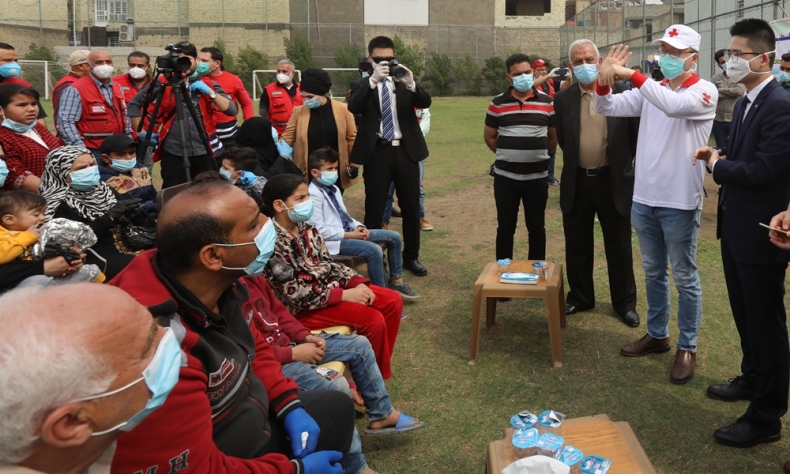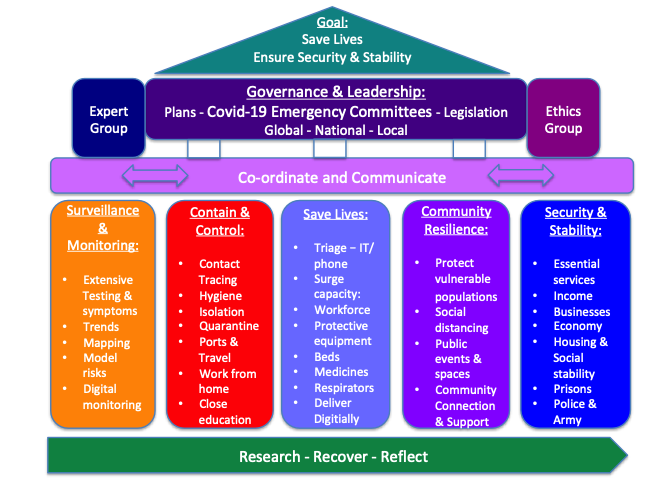The Potential Role of China in Advancing the COVID-19 Policy Framework

During the recovery process, the whole world has to rise to this challenge by rapidly transforming the way we respond and reshape our world to create a secure and sustainable future for all.
The COVID-19 Policy Framework in response to the current pandemic was recently released by the InterAction Council – a group of former world leaders – co-chaired by Bertie Ahern, former prime minister of Ireland, and Olusegun Obasanjo, former president of Nigeria. This report builds on the longstanding emphasis of the InterAction Council to promote global security. The Council’s global health focus in recent years, has been on enhancing the links between human and planetary health to secure the wellbeing of future generations. The COVID-19 Policy Framework aims to provide a comprehensive, multi-sector approach to assist global, national, and community responses now, as well as to promote constructive recommendations for the recovery process.
The world is now watching China, as the first country to respond to the COVID-19 outbreak, and consequently to draw an end to their period of lockdown and initiate a recovery process. China has played a key role throughout the COVID-19 outbreak, from the initial identification of this new infection, its realization of the impact upon health, followed by massive mobilization of community and public health resources to prevent the spread of the virus across China and to protect its population from harm.
At the end of January 2020, following over 200 deaths, the World Health Organization (WHO), in close liaison with China, officially declared a Public Health Emergency of International Concern. In mid-February, China worked in close collaboration with partners, including the WHO, on the Report of the WHO-China Joint Mission on Coronavirus Disease 2019 (COVID-19), to rapidly inform national (China) and international planning on next steps in the response to the COVID-19 outbreak and on next steps in readiness and preparedness for geographic areas not yet affected. As the first country affected by the COVID-19 outbreak, China provided valuable lessons to share with the rest of the world in the COVID-19 Policy Framework on the nature of this new disease, and the public health responses that China took to contain it.
Although a crude indicator, the total number of hospital deaths from COVID-19 has provided an early indication of the progress of the epidemic. As with many countries, China initially struggled to provide community data on deaths attributable to the coronavirus, and has recently revised its estimated deaths from COVID-19 to 4,642 from 3352. As the world struggles to deal with this new disease and overwhelming pandemic, we need to share experiences and resources between countries as well as to co-operate globally in order to co-ordinate our responses and protect vulnerable populations.
Many of these early lessons from China have been used to inform and illustrate the framework, which provides a series of lessons from China to share with the wider world. The main purpose is to inform national, multilateral and global responses — to address the COVID-19 pandemic now, with a view to enhancing coordinated global, regional and national responses. The framework outlined below provides a comprehensive multi-sector response that can potentially be adapted for national and multilateral planning processes.
Since the outbreak, the government of China, along with Chinese philanthropists, have proactively shared clinical guidelines, expertise, and provided healthcare equipment, including respirators and significant resources, rapidly and at scale to over 150 countries in response to the pandemic. These actions reflect the increasing leadership role China is taking to protect vulnerable populations across the world from the impacts of this pandemic.
Aside from sharing experiences and providing resources across the world, President Xi Jinping has taken China’s global responsibilities seriously, by emphasizing a vision of building a community with a shared future for humanity. Additionally, Xi has articulated the role that China has in strengthening global solidarity and cooperation in responding to the COVID-19 pandemic. Furthermore, China has the opportunity to play an even more ambitious global role, by working in collaboration with multilateral organizations, countries and wider partners to further develop, resource, and advance the initial recommendations in the framework. This will cover sustainable development, digital transformation, misinformation prevention, collaborative leadership, establishing an independent global emergency mechanism, strengthening public health protection, enhancing links with multi-sector emergency mechanisms, and increasing research into prevention and preparedness.
In the course of history, we will look back on this catastrophe as a wake-up call of our wider global responsibilities to prevent future pandemics, as well as in responding at speed to our impending climate and environmental crisis. Going forward, the success or failings of our collective efforts will be measured by our ability to learn the deep lessons from this experience. During the recovery process, the whole world has to rise to this challenge by rapidly transforming the way we respond and reshape our world to create a secure and sustainable future for all.
Dr. Joanna Nurse is a strategic advisor to the InterAction Council on global health issues and author of the initial COVID-19 Policy Framework.
 Facebook
Facebook
 Twitter
Twitter
 Linkedin
Linkedin
 Google +
Google +











